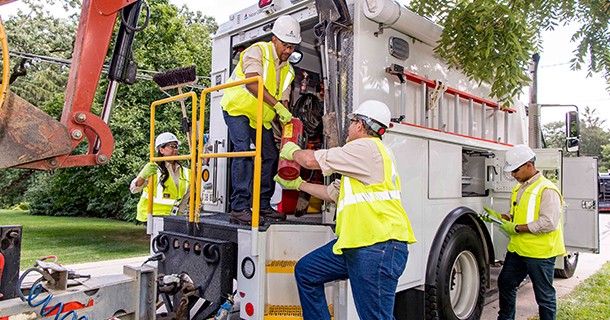Natural Gas Cooling
Natural gas cooling is ideal for commercial facilities such as supermarkets, hotels, warehouses, office buildings and institutions like hospitals, nursing homes, churches and schools. High efficiency, gas-fired cooling equipment is also an excellent choice for factories and other industrial facilities. Three basic types of gas cooling systems are available: absorption, engine-driven and desiccant.
To learn more, email gasadvantage@aglresources.com or 800.427.5463. Choose option 4.
Absorption Systems
Absorption cooling systems rely on a cycle of condensation and evaporation to produce cooling. The absorption process is driven by a heat source rather than a mechanical compressor, like those used in electric chillers. Absorption systems are available as chillers or chiller/heaters, and may be direct-fired by a gas burner or indirectly powered by another heat source (like waste heat from a cogeneration system or industrial process). These systems greatly reduce electric consumption and peak demand. In addition, absorption systems have few moving parts and need very little maintenance.
The advantages of gas absorption systems over conventional electric cooler systems include:
- Lower operating and maintenance costs
- Reduced carbon footprint
- Safer, quieter operation
- Smaller space requirements
Engine-Driven Systems
Gas engine-driven cooling systems use a mechanical process much like electric cooling systems. However, a high-efficiency gas engine instead of an electric motor drives their compressors. Also, the engine and exhaust heat from a gas cooling system can be recovered to efficiently produce hot water or process steam. These systems are available in the 250- to 2,100-ton range, and are popular with universities, hospitals and office complexes, businesses where natural gas engines can power centrifugal or screw chillers in central plants. Customers with smaller cooling needs can install neatly packaged compact units in sizes ranging from 15 to 800 tons.
Desiccant Systems
Desiccant systems help control humidity levels by taking moisture out of the air. These systems are well suited for supermarkets, health spas, hotels, restaurants and other facilities that require low humidity levels. It takes more energy to cool humid air than drier air. By removing moisture, the desiccant system works in tandem with the cooling system and reduces the customer's overall cooling costs. This process also allows for the separate control of temperature and humidity.



